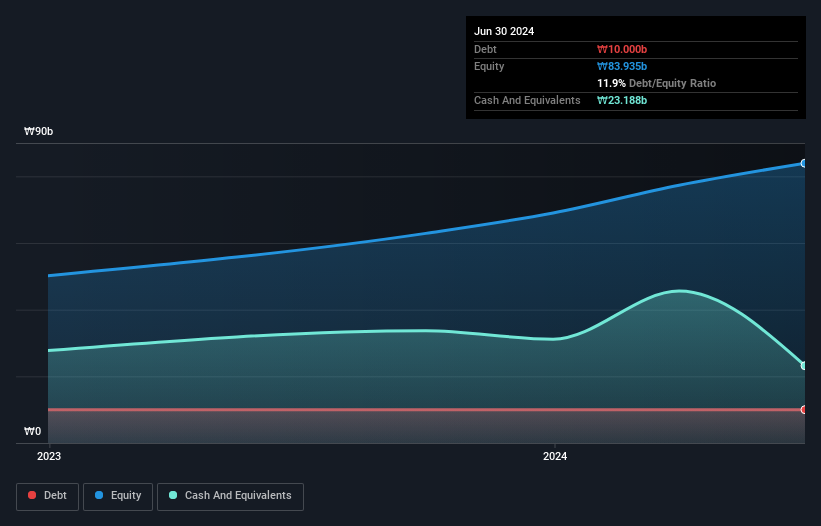These 4 Measures Indicate That iFamilySC (KOSDAQ:114840) Is Using Debt Reasonably Well
Legendary fund manager Li Lu (who Charlie Munger backed) once said, 'The biggest investment risk is not the volatility of prices, but whether you will suffer a permanent loss of capital.' It's only natural to consider a company's balance sheet when you examine how risky it is, since debt is often involved when a business collapses. We can see that iFamilySC Co., Ltd. (KOSDAQ:114840) does use debt in its business. But the more important question is: how much risk is that debt creating?
Why Does Debt Bring Risk?
Debt and other liabilities become risky for a business when it cannot easily fulfill those obligations, either with free cash flow or by raising capital at an attractive price. If things get really bad, the lenders can take control of the business. While that is not too common, we often do see indebted companies permanently diluting shareholders because lenders force them to raise capital at a distressed price. Of course, plenty of companies use debt to fund growth, without any negative consequences. The first step when considering a company's debt levels is to consider its cash and debt together.
Check out our latest analysis for iFamilySC
What Is iFamilySC's Debt?
The chart below, which you can click on for greater detail, shows that iFamilySC had ₩10.0b in debt in June 2024; about the same as the year before. But on the other hand it also has ₩23.2b in cash, leading to a ₩13.2b net cash position.

How Healthy Is iFamilySC's Balance Sheet?
We can see from the most recent balance sheet that iFamilySC had liabilities of ₩47.2b falling due within a year, and liabilities of ₩102.8m due beyond that. Offsetting these obligations, it had cash of ₩23.2b as well as receivables valued at ₩17.5b due within 12 months. So its liabilities outweigh the sum of its cash and (near-term) receivables by ₩6.58b.
Having regard to iFamilySC's size, it seems that its liquid assets are well balanced with its total liabilities. So it's very unlikely that the ₩363.4b company is short on cash, but still worth keeping an eye on the balance sheet. Despite its noteworthy liabilities, iFamilySC boasts net cash, so it's fair to say it does not have a heavy debt load!
Even more impressive was the fact that iFamilySC grew its EBIT by 115% over twelve months. If maintained that growth will make the debt even more manageable in the years ahead. The balance sheet is clearly the area to focus on when you are analysing debt. But ultimately the future profitability of the business will decide if iFamilySC can strengthen its balance sheet over time. So if you're focused on the future you can check out this free report showing analyst profit forecasts.
Finally, a company can only pay off debt with cold hard cash, not accounting profits. iFamilySC may have net cash on the balance sheet, but it is still interesting to look at how well the business converts its earnings before interest and tax (EBIT) to free cash flow, because that will influence both its need for, and its capacity to manage debt. In the last two years, iFamilySC basically broke even on a free cash flow basis. Some might say that's a concern, when it comes considering how easily it would be for it to down debt.
Summing Up
While it is always sensible to look at a company's total liabilities, it is very reassuring that iFamilySC has ₩13.2b in net cash. And we liked the look of last year's 115% year-on-year EBIT growth. So we don't have any problem with iFamilySC's use of debt. When analysing debt levels, the balance sheet is the obvious place to start. But ultimately, every company can contain risks that exist outside of the balance sheet. For example, we've discovered 3 warning signs for iFamilySC (1 shouldn't be ignored!) that you should be aware of before investing here.
Of course, if you're the type of investor who prefers buying stocks without the burden of debt, then don't hesitate to discover our exclusive list of net cash growth stocks, today.
Have feedback on this article? Concerned about the content? Get in touch with us directly. Alternatively, email editorial-team (at) simplywallst.com.
This article by Simply Wall St is general in nature. We provide commentary based on historical data and analyst forecasts only using an unbiased methodology and our articles are not intended to be financial advice. It does not constitute a recommendation to buy or sell any stock, and does not take account of your objectives, or your financial situation. We aim to bring you long-term focused analysis driven by fundamental data. Note that our analysis may not factor in the latest price-sensitive company announcements or qualitative material. Simply Wall St has no position in any stocks mentioned.
 Index Options
Index Options CME Group
CME Group Nasdaq
Nasdaq Cboe
Cboe TradingView
TradingView Wall Street Journal
Wall Street Journal